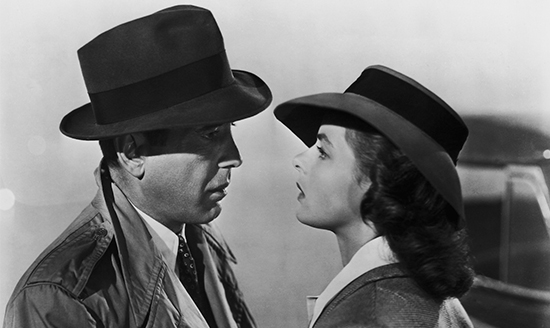Classic Hollywood: Casablanca

Humphrey Bogart told Orson Welles that he was shooting “the worst picture I’ve ever been in.” Ingrid Bergman pleaded with director Michael Curtiz to reveal which man her character would choose, yet with daily script revisions, the best Curtiz could offer was, “Play it in between.” Everyone at Warner Bros. thought it would be a big, fat nothin’ muffin.
So how did a hot mess like Casablanca become a classic? Let us recall the timeless wisdom of Oscar winner William Goldman, who wrote Butch Cassidy and the Sundance Kid and All The President’s Men, “Nobody knows anything…Not one person in the entire motion picture field knows for a certainty what’s going to work.” In the words of Claude Rains’ character from Casablanca, the studio must have been “Shocked…shocked!” that it won Best Picture, Director, and Screenplay at Oscar time.
Casablanca was based on the unproduced play, “Everybody Comes to Rick’s.” In the book Warner Brothers Presents, Ted Sennett sums it up as “a magical film that has become a legend, a cult, and perhaps the single Warners movie most cherished by filmgoers…riddled with improbable situations and unlikely dialogue, yet somehow it all works beautifully.”
I gotta quibble with Sennett on one point. The “unlikely dialogue” in Casablanca delivered more quotable gems than any picture I can think of (though “Play it again, Sam” is not among them): “Here’s looking at you, kid,” “We’ll always have Paris,” “Round up the usual suspects,” “I don’t mind a parasite. I object to a cut-rate one,” “I stick my neck out for nobody,” “Of all the gin joints in all the towns in all the world, she walks into mine,” and one of the greatest last lines in Hollywood history, “Louie, I think this is the beginning of a beautiful friendship.”
Casablanca proved pivotal to Bogart’s career. He was 42, an age when most actors are past their stardom sell-by date, but Bogie’s performance rocket-fueled his fame. According to Sennett, “It gave Bogart his first chance at a romantic part since achieving stardom in The Maltese Falcon one year earlier. It added dimension to his tough personality. It showed the couldn’t-care-less-guy had an Achilles heel. In the Falcon, he cold-bloodedly ditched Mary Astor. Now, for the first time, Bogie found what it felt like to be a reject in the game of love.”
Writer David Zinman agrees: “It is the picture that most perfectly delineates the Bogart mystique. To the world, Rick Blaine is the cynical cafe boss, the uncommitted guy who doesn’t give a damn about anything but himself. Inwardly, he’s an idealist…motivated by a deep-seated honesty. Although he puts on the cool front, he’s really a good guy committed to doing the right thing in the end.”
And for my money, it’s the ending that sealed Casablanca’s greatness. While romantics may wish for Rick and Ilsa to reunite, Roger Ebert notes, “That would be all wrong; the ‘happy’ ending would be tarnished by self-interest, while the ending we have allows Rick to be larger, to approach nobility. And it allows us, vicariously experiencing all of these things in the theater, to warm in the glow of his heroism.”
By the way, if you aren’t moved by Rick’s customers’ rousing rendition of “La Marseillaise,” check your pulse. Many of the extras in that scene were refugees from Nazi-occupied countries. They didn’t have to fake their emotional reactions for the camera. The tears in their eyes are real.
Classic Hollywood posts appear bi-monthly on The Music Hall blog.
